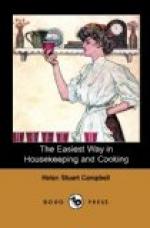Salt stands foremost. Vinegar, lemon-juice, and pickles owe their value to acidity; while mustard, pepper black and red, ginger, curry-powder, and horse-radish all depend chiefly upon pungency. Under the head of aromatic condiments are ranged cinnamon, nutmegs, cloves, allspice, mint, thyme, fennel, sage, parsley, vanilla, leeks, onions, shallots, garlic, and others, all of them entering into the composition of various sauces in general use.
Salt is the one thing indispensable. The old Dutch law condemned criminals to a diet of unsalted food, the effects being said to be those of the severest physical torture. Years ago an experiment tried near Paris demonstrated the necessity of its use. A number of cattle were fed without the ration of salt; an equal number received it regularly. At the end of a specified time, the unsalted animals were found rough of coat, the hair falling off in spots, the eyes wild, and the flesh hardly half the amount of those naturally fed.
A class of extreme Grahamites in this country decry the use of salt, as well as of any form of animal food; and I may add that the expression of their thought in both written and spoken speech is as savorless as their diet.
Salt exists, as we have already found, in the blood: the craving for it is a universal instinct, even buffaloes making long journeys across the plains to the salt-licks; and its use not only gives character to insipid food, but increases the flow of the gastric juice.
Black pepper, if used profusely as is often done in American cooking, becomes an irritant, and produces indigestion. Red pepper, or cayenne, on the contrary, is a useful stimulant at times; but, as with mustard, any over-use irritates the lining of the stomach.
So with spices and sweet herbs. There should be only such use of them as will flavor well, delicately, and almost imperceptibly. No one flavor should predominate, and only a sense of general savoriness rule. Extracts, as of vanilla, lemon, bitter almond, &c., should be used with the greatest care, and if possible always be added to an article after it cools, as the heat wastes the strength.
BEVERAGES.
Tea and coffee are the most universal drinks, after water. The flavor of both is due to a principle, theine in tea, caffeine in coffee, in which both the good and the ill effects of these drinks are bound up. It is hardly necessary the principles should have different names, as they have been found by chemists to be identical; the essential spirit of cocoa and chocolate,—theobromine,—though not identical, having many of the same properties.
Tea is valuable chiefly for its warming and comforting qualities. Taken in moderation, it acts partly as a sedative, partly as a stimulant, arresting the destruction of tissue, and seeming to invigorate the whole nervous system. The water in it, even if impure, is made wholesome by boiling, and the milk and sugar give a certain amount of real nourishment. Nervous headaches are often cured by it, and it has, like coffee, been used as an antidote in opium-poisoning.




